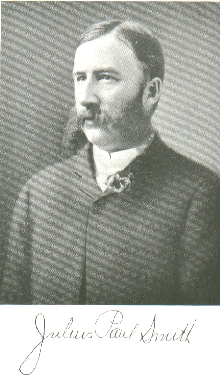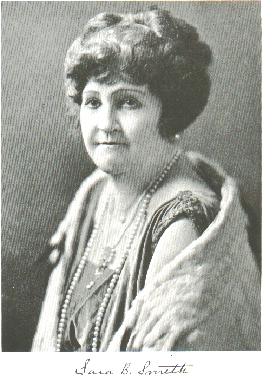

JULIUS PAUL SMITH
Julius Paul Smith became a prominent figure in advancing the borax and vineyard industries of California. With the business interests of this state he identified himself in the early seventies, and remained a factor therein until his death on June 29, 1904. In 1888 he had moved with his family to New York City, maintaining his home there twelve years, when a stroke of paralysis made it necessary to curtail his activities. During the period of his residence in the national metropolis he returned with his family to California each year, passing the vintage seasons on his fine vineyard estate near Livermore, Alameda County. This property comprised-2000 acres and is known as "Olivina," a combination of the words Olive and vine. The late Mr. Smith was a man of fine intellectuality, was much of a linguist, and his critical knowledge of literature was sure and authoritative.
Representing one of the sterling pioneer
families of the Badger State, he was born on a farm near Richmond, Wisconsin,
in December, 1842. His parents, Henry and
Charlotte (Paul) Smith, were born and reared in the State of New York, were
early settlers in Wisconsin, but they passed the latter part of their lives in
California. Their children besides
Julius P., were: Byron G., deceased;
Francis M., a resident of Oakland, California; Mrs. Ella Rosencranz, a resident
of San Jose; and Mrs. Julia Sperry and Mrs. Ida Calkins, both deceased.
After the discipline of the common
schools of Wisconsin Julius Paul Smith also had collegiate advantages, but at
the age of nineteen laid aside his studies and tendered his aid in defense of
the Union, when the Civil war began. He
enlisted in a regiment of Wisconsin Volunteer Infantry and was in the service
three years, participating in many engagements. He was captured by the enemy
and held for some time in Libby Prison at Richmond, Virginia. At the Battle of Resaca, Georgia, on May 3,
1864, while making a charge, he received a wound in his right arm,
incapacitating him for further active duties in the field. Though compelled thereafter to use his left
hand in writing, he developed in time an excellent penmanship.
After the close of the war Mr. Smith
became associated with his brother Byron in the farm implement and machinery business
at Janesville, Wisconsin. He was also
engaged in the retail grocery business there, and owned a farm of ninety acres
near the city. Mr. Smith came to San
Francisco about the year 1873. At
Chicago, he promoted and formed a company which procured the requisite machinery, and with his brother
Francis M. he established at Teels Marsh in Nevada a borax factory. This enterprise developed into one of broad
scope and importance, with headquarters in San Francisco, where William T.
Coleman was the company's agent. The
business was carried on as Smith Brothers and eventually became the Pacific
Coast Borax Company. Julius P. Smith
had much to do with making borax, a familiar household article, it being his
idea to pack the product in small packages that could be advertised and could
be easily sold and distributed by retail merchants.
After establishing this business on a
firm basis Mr. Smith found his attention attracted to the wonderful
possibilities of California as a vine growing state, and around about 1881,
after extensive travel, he purchased a large tract in the southern part of the
Livermore Valley, known as Olivina, and undertook the development of his great
and splendid California vineyard.
Preliminary to his business of wine making he spent three years abroad,
leaving the development of his vineyards with a local manager. He studied intimately the methods of vine
tillage and wine making in the European countries. He carried with him credentials from James G. Blaine, then
secretary of state, and he was admitted to some of the most noted cellars of
Europe. He used his knowledge not only in private enterprises but through
magazine articles and in other ways did much to educate the people of
California to the value of the wine grapes.
He succeeded under great difficulties in building up a fine business and
always sold his wine under the California label. He was perfectly willing to let his wine go before the public on
its merit, and he popularized wines under his own brand and those made in California. In this business he found both pleasure and
profit, and his example serves as a great impetus to the wine industry of the
entire state. He, while abroad, sent
cuttings from some of the principal vineyards of Europe to Olivina and in time
the Olivina itself acquired a world wide reputation. In about 1887 he bought out his brother's interest, and after
selling back to his brother his interest in the borax industry, about 1891, he
devoted the remainder of his life to the growing of grapes and the development
of a wine that was generally conceded to equal any foreign product.
He made his home at Olivina a delight to
those cultured people who had the pleasure of visiting it. It contained a collection of rare and
valuable paintings gathered in his European travels, and included many interesting
curios from all parts of the world. He was a man of most engaging personality,
and his circle of friends was co-extensive with that of his acquaintances. In New York City he was a member of the
Colonial and the Manhattan Chess clubs, and in San Francisco he held membership
in the Cosmos Club and the Chess Club.
Among the many tributes paid him at the
time of his death a paragraph from one is roughly expressive of the feeling and
judgment of his many friends:
"Although Julius Paul Smith has
passed from the sphere of his usefulness his spirit lives. For generations to come California will
profit by his cleverness and patriotism which prompted him to devote a large
part of his life to the exemplification of the possibilities of California's hillsides
if put under proper cultivation."
On November 24, 1870, Mr. Smith married
Miss Sarah Barker. Mrs. Smith, who for nearly twenty years has been proprietor
of Olivina, was born and reared in the State of New York. She continued the
operation of the Livermore property and also maintains a home in San
Francisco. In addition to her numerous
business responsibilities she has found time for extensive travel, spending one
winter in London, one in New York City and one in Florida, and has toured the continent
and has been entirely around the world.
She is the daughter of the late James Barker, a New York merchant and
prominent in Masonic circles. There
were eighteen Barker officers in the Revolutionary war, Mrs. Smith's father being a descendant of one
of them. Her mother was Olive (Phelps)
Barker, a native of New York and of Revolutionary stock and English
descent. All her grandparents were New
England people, one of them being of Quaker stock. Mrs. Smith's grandmother Barker was a lineal descendant of Josiah
Bartlett, one of the signers of the Declaration of Independence.
Mrs. Smith is a member of the
Knickerbocker Chapter of the Daughters of the American Revolution, the National
Society of New England Women and the National California Club, all in New York;
the California Club, the American College Club, the San Francisco Center of the
Civic League, National League for Women, Service Club, University of Fine Arts,
all in San Francisco. She is also a life
member of the Red Cross Society, a life member of "Save the Redwoods"
Society, and a member of the Woman's San Francisco Building Association. She is a life member of the Navy League, and
attended a banquet of that organization in Washington, District of Columbia, at
the inauguration of President Harding.